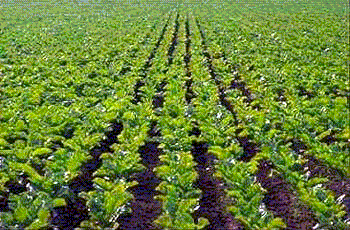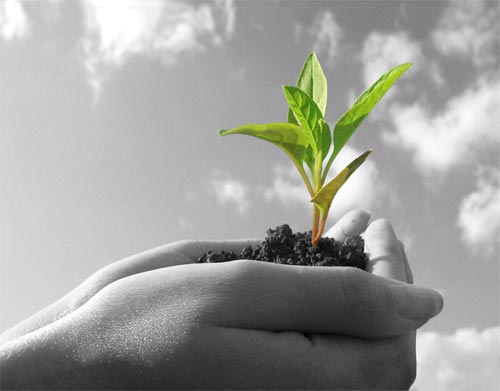UNEP Green Economy Initiative Assesses Role of Sustainable Agriculture in Boosting Exports, Livelihoods and Jobs Across the Region - The potential to create a booming organic agriculture sector across Eastern Europe, the Caucasus and Central Asia is the focus of a study announced today by the UN Environment Programme (UNEP).
Geneva, 12 April 2010
 UNEP is partnering with the International Federation of Organic Agriculture Movements (IFOAM) to examine the economic, employment, poverty reduction and environmental benefits that could be achieved through greater investment in sustainable agriculture in the Eastern Europe, Caucasus and Central Asia (EECCA) region.
UNEP is partnering with the International Federation of Organic Agriculture Movements (IFOAM) to examine the economic, employment, poverty reduction and environmental benefits that could be achieved through greater investment in sustainable agriculture in the Eastern Europe, Caucasus and Central Asia (EECCA) region.
This latest Green Economy Initiative project, being conducted at the request of environment ministers of the UN Economic Commission for Europe region, will include a sub-regional analysis and national studies in Ukraine, Armenia and Moldova.
National workshops will be organised in the three countries to consult a broad range of stakeholders, and the first forum in Armenia will be held tomorrow (13 April).
The study, funded by the Government of Sweden, will build on the findings of a 2007 report on sustainable consumption by UNEP and the European Environment Agency which concluded that the EECCA region's low use of synthetic fertilisers and pesticides, and its availability of workers presented good prospects for the growth and export of organic food products to Western Europe.
 According to the IFOAM, organic agriculture worldwide is developing rapidly with 35 million hectares of agricultural land managed organically by almost 1.4 million producers in over 150 countries, and the European Union is one of the world's largest and fastest growing markets for organics.
According to the IFOAM, organic agriculture worldwide is developing rapidly with 35 million hectares of agricultural land managed organically by almost 1.4 million producers in over 150 countries, and the European Union is one of the world's largest and fastest growing markets for organics.
Yet the share of organic farmland in Ukraine and Moldova is less than 1%, while sustainable farming is just beginning in Armenia.
Achim Steiner, UN Under-Secretary-General and UNEP Executive Director, said: "Organic agriculture can trigger sharply polarized views, sometimes presented as the anti-dote to modern, intensive agriculture systems or cast as a niche, luxury market for the few and the rich.
"But there is increasing evidence from Africa and elsewhere that organic agriculture can play its part in feeding the world and in meeting various sustainability goals, from water and improved soil quality to delivering higher levels of employment and conservation of biodiversity," he said.
"Several countries in Eastern Europe, the Caucasus and Central Asia are already producing organic produce and are part of one of the world's growth industries. This new initiative aims to assist in catalyzing more countries to take part and to increase the hectares of organic production in a region keenly looking for sustainable, Green Economy choices," added Mr Steiner.



 Environment Writings
Environment Writings





 In the last few decades, international biodiversity diplomacy (bio-diplomacy) has undergone deep changes in both its nature and scope. These changes have been characterized by an intensification and diversification of relevant constituents and actors, the increased complexity of relevant subject matter, and a broadening of the diplomatic agenda to include areas with a strong connection to science and technology policy, business, standard setting, and rule making.
In the last few decades, international biodiversity diplomacy (bio-diplomacy) has undergone deep changes in both its nature and scope. These changes have been characterized by an intensification and diversification of relevant constituents and actors, the increased complexity of relevant subject matter, and a broadening of the diplomatic agenda to include areas with a strong connection to science and technology policy, business, standard setting, and rule making. UNEP is partnering with the International Federation of Organic Agriculture Movements (IFOAM) to examine the economic, employment, poverty reduction and environmental benefits that could be achieved through greater investment in sustainable agriculture in the Eastern Europe, Caucasus and Central Asia (EECCA) region.
UNEP is partnering with the International Federation of Organic Agriculture Movements (IFOAM) to examine the economic, employment, poverty reduction and environmental benefits that could be achieved through greater investment in sustainable agriculture in the Eastern Europe, Caucasus and Central Asia (EECCA) region.
 Last December, a very large majority of the scientific community and most politicians would have agreed that the scientific evidence of human-induced climate change was unequivocal and that the only question was whether the world’s political leaders could agree in Copenhagen to meaningful legally binding greenhouse gas emission reduction targets.
Last December, a very large majority of the scientific community and most politicians would have agreed that the scientific evidence of human-induced climate change was unequivocal and that the only question was whether the world’s political leaders could agree in Copenhagen to meaningful legally binding greenhouse gas emission reduction targets. 

